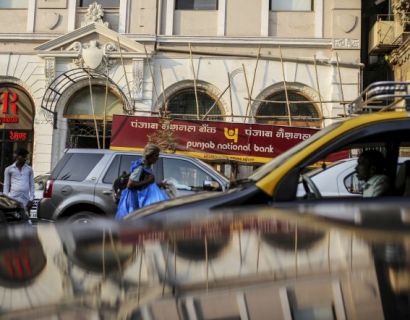Everything for  Business
Business
 Business
Business
 Business
Business
Punjab National Bank is said to get largest single allocation
Injection intended to bolster capital, meet bond payments

India will inject at least 135 billion rupees ($2 billion) into state-controlled banks this month, as it seeks to shore up capital buffers and help the lenders meet coupon payments on their bonds, people familiar with the matter said.
The new capital infusion will ensure the state banks have room to grow their loan books while meeting capital requirements, the people said, asking not to be named as the information isn’t public. It’s the latest step in Prime Minister Narendra Modi’s 2017 plan to add 2.11 trillion rupees of capital into the lenders over two years, the people added.
The government has been forced to inject capital because worries about bad debt and poor profitability has made it difficult for Indian banks to raise money on their own. The scope of state-controlled banks to sell shares has also been curtailed by a rule that requires the government to own at least 51 percent of the lenders.
Punjab National Bank, which has been short of capital after being hit by a record $2 billion fraud, gets the single largest capital allocation at 28 billion rupees, the people said.
The new capital allocation breaks down as follows, they added:
| Punjab National Bank | 28 billion rupees |
| Corporation Bank | 25 billion rupees |
| Central Bank of India | 24 billion rupees |
| Indian Overseas Bank | 21 billion rupees |
| Andhra Bank | 20 billion rupees |
| Allahabad Bank | 17 billion rupees |
Finance Ministry spokesman D.S. Malik didn’t immediately respond to two calls to his mobile phone.
PNB needs to pay about 1.35 billion rupees on July 25 to cover annual interest on 15 billion rupees worth of perpetual debt. Unless it gets fresh capital in time, it may be unable to make the payment because an unprecedented loan fraud wiped out its profits and pushed the bank’s capital below mandated levels, according to the local unit of Fitch Ratings.
Coupon payments of about 990 million rupees are due for Andhra Bank’s so-called AT1 bonds in August, BloombergQuint reported Tuesday citing Anil Gupta, vice president of financial sector ratings at ICRA, the local unit of Moody’s Investors Service. While Allahabad Bank, Indian Overseas Bank and Corporation Bank have recalled their AT1 bonds, they have to service coupon payments on upper tier 1 and upper tier 2 bonds, according to the report.
bloomberg.com
 What are you doing with your RV in the offseason?
What are you doing with your RV in the offseason?
 Adobe will buy online design startup Figma for $ 20 billion
Adobe will buy online design startup Figma for $ 20 billion
 To combat the gas crisis, Germany offers a new plan for cheap transit
To combat the gas crisis, Germany offers a new plan for cheap transit
 Porsche family seeks iPO buyout after tearful defeat
Porsche family seeks iPO buyout after tearful defeat
 Clubs and bars are popping up all over Manhattan, providing an alternative social hub and jobs.
Clubs and bars are popping up all over Manhattan, providing an alternative social hub and jobs.
This site uses cookies and other visitor identifiers for the convenience of each user. If you stay on our site after reading this message, it means that you have no objection to the use of these technologies. Learn more
